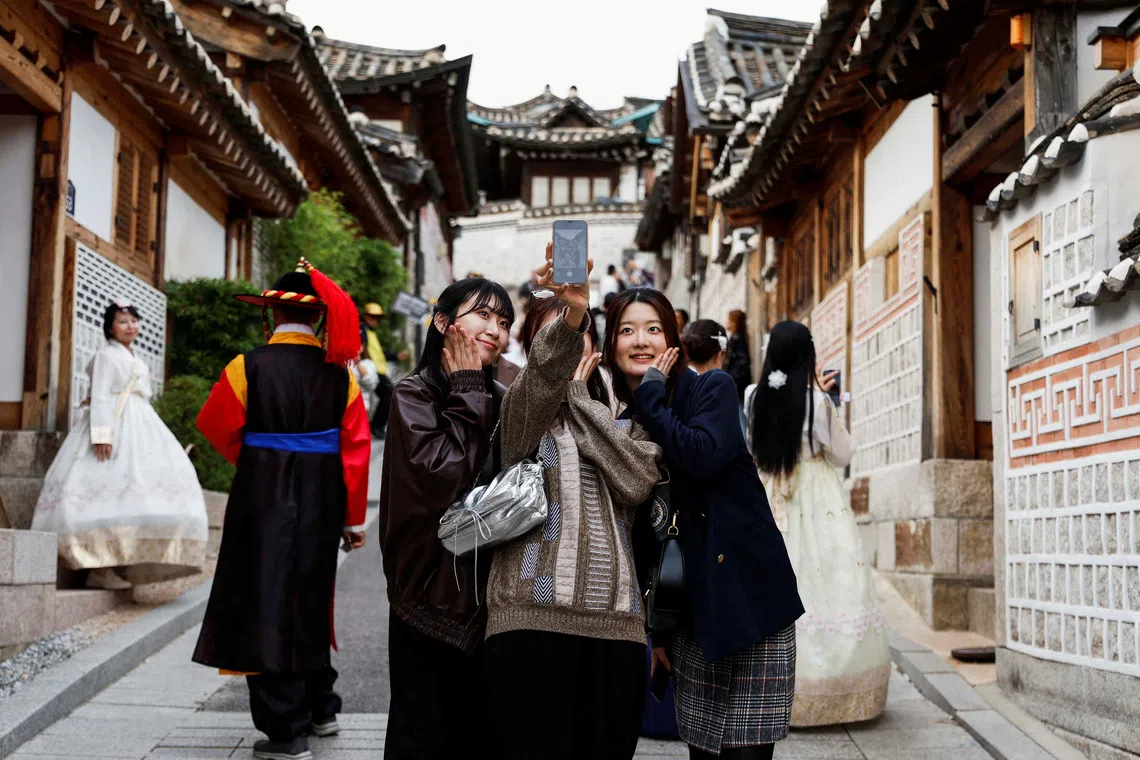South Korea eases rules on urban homestay businesses for overseas tourists
Sign up now: Get insights on Asia's fast-moving developments

The South Korean government has pledged to take extensive measures to strengthen the tourism ecosystem.
PHOTO: REUTERS
Follow topic:
SEOUL – South Korea’s Ministry of Culture, Sports and Tourism announced on Oct 10 that it has eased regulations on urban homestay businesses for overseas tourists in response to the growing demand for inbound tourism.
The revision focuses on removing outdated restrictions on old buildings and relaxing foreign language service evaluation standards for residents wishing to rent out rooms to overseas tourists.
The ministry explained that the change came after gathering input from the Korea Urban Homestay Business Association and local governments, aiming to reflect on-the-ground realities.
Previously, homes older than 30 years were automatically excluded from registration as urban homestay accommodations, regardless of their structural safety. Under the revised guidelines, local governments may now approve such properties if they are deemed safe under the Building Act and the Act on the Management of Buildings.
The revised guidelines also ease the standards for evaluating foreign language services. In the past, hosts were evaluated mainly on their personal fluency.
Now, effective communication with guests, even through translation apps or other assistive tools, can be recognised as sufficient. The ministry has also abolished the previous requirement that referenced standardised test scores equivalent to a TOEIC score of 760, instead focusing on whether hosts can provide practical guidance and convenience to overseas visitors.
This policy revision follows discussions at the 10th National Tourism Strategy Meeting on Sept 25, where the Culture Ministry presented “policy and industry infrastructure innovation” as one of three major reform goals. The new guideline represents one of the first follow-up actions under that initiative.
Amid rising international interest in visiting South Korea and a new government target of attracting 30 million overseas visitors by 2030, the government has pledged to take extensive measures to strengthen the tourism ecosystem – from creating new regional tourism hubs to overhauling decades-old tourism laws. According to the Korea Tourism Organisation, about 16 million tourists visited South Korea in 2024.
As part of efforts to expand lodging supply and improve quality, the government is also considering easing accommodation regulations. It plans to legalise home-sharing for South Korean residents, which is currently restricted to overseas tourists and platforms such as Airbnb, as part of broader reforms to boost the competitiveness of Korea’s lodging industry.
According to a Culture Ministry official, around 5,000 home-sharing businesses – urban residents offering lodging and cultural experiences to overseas tourists in homes under 230 square meters – were officially registered in 2024.
Meanwhile, as at October, Airbnb will require all hosts in South Korea to submit proof of business registration to continue operating, as part of efforts to remove unlicensed or illegal listings.
Approximately 30,000 unlicensed accommodations are expected to be delisted, including properties such as officetels, which cannot legally register as lodging businesses under Korean law. THE KOREA HERALD/ASIA NEWS NETWORK

